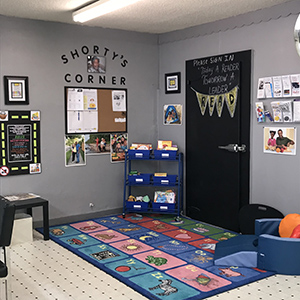Starting School Prepared Should Be a Right, Not a Privilege

In theory, a child’s very first day of school is their first fresh start. It happens before anyone has proved better in the classroom, on the soccer field or in the hallways. It’s anyone’s game and every child has a shot at success, an equal chance to learn, make friends and thrive.
It certainly sounds fair. But the reality is very different for many children across the country. According to a recent national study on early childhood development, just a little over half of American children were considered developmentally healthy. These disparities are especially apparent for those with less money and less opportunity, placing poor children at a higher risk of chronic health conditions and developmental concerns.
Parental income and maternal education are among many factors that predict children’s outcomes before birth and through those early years. Together, these cause children to start kindergarten at various stages of readiness.
Simply put, not all children have the chance to start school on equal footing. NICHQ’s Early Childhood Comprehensive Systems Collaborative Improvement and Innovation Network (ECCS CoIIN), an initiative that seeks to increase developmental skills among 3-year-old children and reduce developmental disparities, is aiming to change that.
Over a five-year period, ECCS CoIIN participating states and communities are working to improve early childhood systems that promote healthy child development and help identify developmental challenges as early as possible. They’re aiming high with a goal of increasing the developmental skills of 3-year-old children in participating communities by 25 percent.
Parents are perhaps the most important ally in this work, says NICHQ ECCS CoIIN Project Director, Zhandra Levesque, MPH. “They are children’s primary support system: the source of the stimulation and encouragement children need to grow. If we can reach and engage more parents as well as bolster community support, we can help more children. Because of this, we’re prioritizing family engagement and partnership to ensure we lead with the needs of families and the communities in which they live, play and work.”
Engaging parents as catalysts for improving early childhood outcomes has serious potential. But for parents to spark the change, they need comprehensive systems and social supports that keeps them informed and empowered. This is where ECCS CoIIN comes in. Over the past two years, they’ve identified a variety of ways to meaningfully partner with parents, and give them the tools to be champions for their children. Below, we’ve pulled out some bright spots from this work. Together, they offer a path for other communities and states as they consider how to transform their own early childhood systems and address developmental disparities.
Tips from the Field
From Alaska: Consider hosting or attending community-centric events that bring together families from isolated areas and help them engage in shared learning. Activities like a community baby shower or a kids’ dance party are opportunities to reach families in a comfortable setting while providing resources about developmental health.
Similarly, Parent Cafés provide a safe space where parents can engage in meaningful conversations about strengthening families.
“The Be Strong Parents, Alaska Parent Cafés are a major accomplishment for us,” says Ashley Christopherson, the Alaskan State ECCS coordinator. “We’ve seen strong family involvement and participation, with some past attendees even planning to engage as parent facilitators in the next meeting. We’re also looking for ways to reach more high-needs families, specifically those that are new to the area and involved in protective services.”

In comparison, Oklahoma capitalized on natural community gathering places to support parents in low-income neighborhoods in the Choctaw Nation, transforming a popular barber shop and local community center into sites for early childhood learning and parent education. Books for children and resources for parents are stocked in what they’ve titled “early literacy corners.” A father can now read to his child while getting a routine hair cut; a mother who brings her children to the community center can take home interactive parent-child activities that she can’t afford on her own. These “early literacy corners” (pictured right) help ensure that all parents have access to developmental activities for their children and understand what supportive services are offered in their county.
Community-centric interventions can also help teach parents about the importance of developmental screenings, which, as Levesque explains, can change a child’s future.
“If a little boy is falling behind on any of his developmental milestones, a screening will spark proactive interventions so that his family receives the services and resources they need, and that little boy starts school ready to learn. Without this screening, his first day of school looks very different.”
To help parents learn about screenings, Utah hosted a “Books, Blocks and Balls” event to encourage interactive parent-engagement. Along with introducing families to developmental reading and play, the event included information about the Ages and Stages Questionnaire (ASQ), a trusted screener that parents can fill out in just five minutes.
Indiana partnered with their local Women, Infants and Children (WIC) office to streamline the questionnaire into routine appointments that target low-income families, a strategy that emphasizes convenience and access for at-risk families.
“Improving systems that support families is often about building bridges,” says Levesque. “When programs aren’t working together, families can get overwhelmed trying to access the services they need. The less hoops they have to jump through, the better. In Indiana, busy parents can now fill out the screening questionnaire while waiting for their regular appointment. It’s a great example of the big potential in seemingly small systems improvements.”
Digital communication is another opportunity to remove access barriers and empower families. Simple text-messaging services make it easier to connect with parents, especially those who are further from community resources. Utah implemented Bright by Text, a program that sends parents and caregivers free activities, parenting tips and resources, all of which are targeted for children in their early years of life. Similarly, Kansas’s Screen Early website provides families with free resources on early developmental milestones, activities and screenings.
Over the next three years, states will continue to identify strategies that support parents and caregivers. And as these strategies are spread and spanned across the country, the potential for improved early childhood health will multiply exponentially.
“With children’s brains developing at their fastest rate, early childhood represents a rare opportunity to support rapid learning and development, with small efforts amounting to big returns for children’s future,” says Levesque. “Positive parent-child interactions, early learning, access to developmental screenings — each increases their developmental potential; each helps them start school ready to thrive; and each is made possible by empowering parents and caregivers.”
The ideas highlighted in this article are joined by a number of other strategies states have identified in their efforts to develop a comprehensive early childhood system. Interesting in staying up-to-date on their work? Join NICHQ’s mailing list.
This article was created in partnership with Zero to Three.
